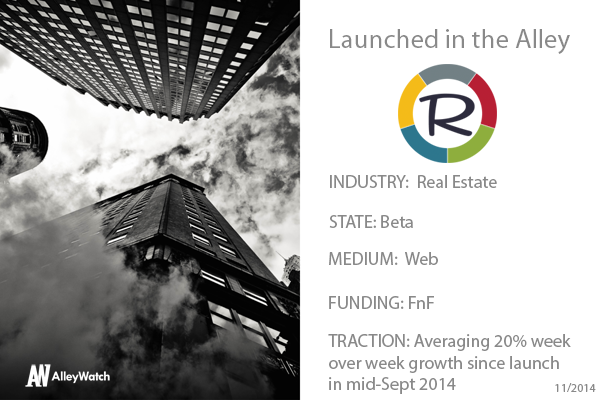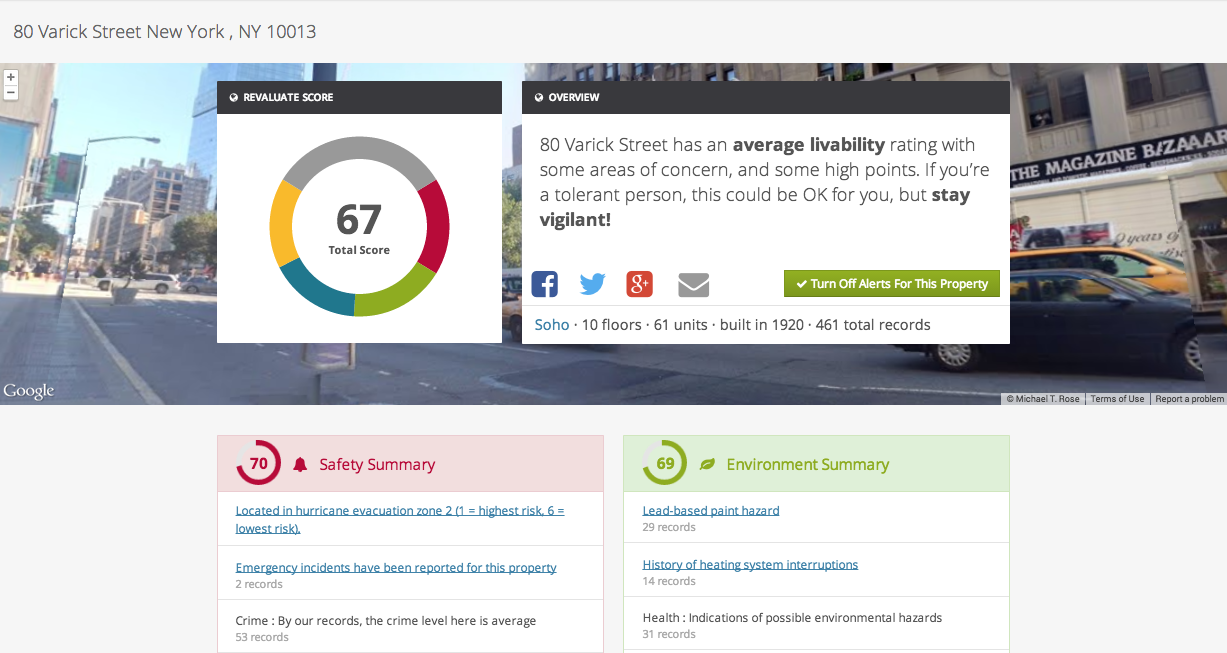You see an apartment for a few minutes during the day. Looks good. You sign the dotted line.
But what about those hiddens that you don’t see and wouldn’t know about until after you move in. Noisy neighbors. Nosy neighbors. Noisy neighborhood. Are there rats running free in the streets? Not to mention other vermin who might have taken up residence closer to home.
With Revaluate, it doesn’t have to be a crap shoot.
Revaluate lets you know what it’s like to live there… before you move. And you might not want to after all, once you’ve gotten the real story.
Revaluate has built the largest, unique real estate database sourcing public and private information to help people know what its really like to live at an address.
The Revaluate report allows you to quickly compare multiple addresses, where every address is scored on Environment, Safety, Quality of Life and Expenses. Revaluate lets you see its history, lawsuits, crime, trends and even what celebrities live near. Oh, and about hidden costs, too, that you might not otherwise be aware of. The detailed alerts in the report help you easily find benefits and concerns.
So, yes, they tell you about the positives about the place, too.
The reports are based on data from over 2,000 public and private sources – rather than people’s reactions and feelings, so Revaluate results are always authentic and standardized.
Revaluate knows what its really like to live at an address. And the best part is – you know before you move in. Manhattan only at present, but you know Manhattanite – we always have to get the story. It works for Airbnb, too!
Cofounder Max Galka tells us about his service that focuses on the other side of the housing market.
Tell us about the service.
The concept is simple. We do for housing what online reviews do for every other consumer product. We report the positive and negative qualities of a home that a prospective buyer or renter may not otherwise know, and hopefully help them to choose a place they’re going to be really happy with.
Our reports are based on data from over 2,000 public and private sources, much of which has never before been available. We score each building on Safety, Environment, Quality of Life, and Expenses, which makes it easy to compare different options side-by-side. You can also see very specific information about each building such as pest problems, lawsuits, noise, environmental hazards, and utility costs. For fun, we also include information about noteworthy neighbors and movie scenes that were filmed nearby.
How is it different?
Currently, listing portals like Zillow are most people’s primary source of housing information. Revaluate is similar in the sense that it also provides housing information, but the nature of the information is very different. In a nutshell, listing portals tell you what the different housing options are, while we help you choose between those options by telling you more about what it would actually be like to live there.

What market are you attacking and how big is it?
The size of the U.S. residential real estate is almost two trillion dollars per year. On top of that, $45 billion is spent each year on transaction costs, paid to brokers, lawyers, and building inspectors. Our value proposition overlaps somewhat with these industries, but those are not markets we’re trying to disrupt. We see more opportunity in partnering with them and focusing instead on making the system more efficient.
What is the business model?
We are exploring different possibilities, but for now the plan is to operate similar to Carfax, selling reports to both consumers and real estate professionals.
Which factors are most important to potential homebuyers in Manhattan, based on your collected data?
We’ve spent a lot of time investigating this question. Once you go beyond the basic characteristics like square footage and pricing, it seems to be a three-way tie between crime, rats, and noise, traffic noise in particular.
There are some other factors that are not on most people’s radar, but which I would argue are also very important. For example, because of the idiosyncratic way that New York City determines property taxes, the effective tax rate can vary anywhere from 0.05% to 5%. For a million dollar condo, that is the difference between paying $50,000 per year and paying $500. Air quality is another factor that few people consider, but when you look at its health effects the numbers are truly staggering. Fortunately, New York has done a lot in recent years to make the air cleaner, but there are still certain areas of the City where it is a major health hazard.
What are the milestones that you plan to achieve within six months?
By that time, we should have reached 100% coverage in New York City, and we will be starting to plan for expansion into other cities. We also have some new features in the works including some really interesting information on New York City schools.
If you could be put in touch with one investor in the New York community who would it be and why?
RRE Ventures. Their name comes up a lot in relation to Real Estate Tech, and they always seem to have an interesting perspective. Real estate is changing fast, and I would love to hear their thoughts on where it is going.
Why did you launch in New York?
New York is at the forefront of the open data movement, both in terms of the amount of data they make available and the resources they provide for companies that use it. For a business that works with municipal data, there is no better place to be. Besides that, my wife and I love living here.





